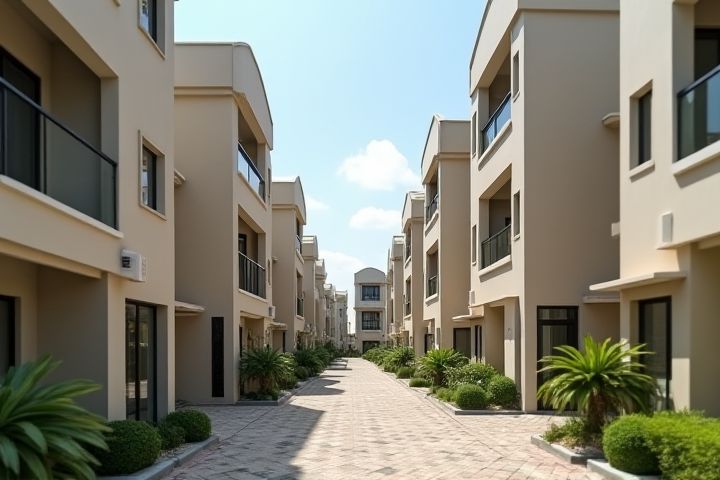
The housing market in Nigeria has experienced significant growth, driven by urbanization and a burgeoning population. Major cities like Lagos, Abuja, and Port Harcourt showcase a rising demand for affordable housing options, as many citizens seek better living conditions. Real estate developers are increasingly focusing on mixed-use developments that combine residential, commercial, and recreational spaces to meet modern lifestyle needs. The government has also initiated several housing schemes aimed at increasing homeownership and reducing the housing deficit, which currently stands at millions of units. As a potential buyer or investor, understanding local market trends and regulatory frameworks is essential for making informed decisions in this dynamic sector.
Population-driven demand
Nigeria's housing market is rapidly influenced by its burgeoning population, currently exceeding 200 million, which significantly drives demand for affordable housing options. Urbanization is accelerating, with over 50% of the population residing in urban areas, thereby intensifying the need for residential developments in metropolitan regions. The rising middle class, coupled with increasing income levels, is creating new opportunities for real estate investors and developers to cater to diverse housing needs. In response to these trends, innovative building techniques and financing solutions are emerging to make housing more accessible for you and the growing population.
Urbanization trends
Nigeria's housing market is significantly influenced by rapid urbanization trends, with cities like Lagos, Abuja, and Port Harcourt experiencing explosive population growth. The increasing migration from rural areas to urban settings has intensified the demand for both affordable and luxury housing options, driving innovations in construction and real estate development. As infrastructure continues to evolve, particularly with government initiatives and private investments, you may witness a transformation in urban living standards, affecting property values and rental prices. Understanding these dynamics is crucial for investors and residents aiming to navigate Nigeria's evolving housing landscape.
Affordable housing shortage
The housing market in Nigeria faces a significant challenge with the shortage of affordable housing, exacerbating the urbanization crisis. Current estimates indicate a deficit of over 17 million housing units, making it increasingly difficult for low and middle-income families to access quality living conditions. The high cost of construction materials, coupled with limited access to financing options, has hindered the development of affordable housing projects across the country. To address this pressing issue, innovative solutions such as public-private partnerships, modular housing, and government incentives are essential for creating sustainable and economically viable housing options for Nigerians.
Government policies
The Nigerian housing market is significantly influenced by government policies aimed at promoting affordable housing and urban development. Initiatives like the National Housing Policy encourage public-private partnerships, enhancing investment opportunities in real estate. The Federal Mortgage Bank of Nigeria (FMBN) offers various loan products to assist low-income families in acquiring homes, directly impacting housing accessibility. Regulatory frameworks, such as the Land Use Act, play a crucial role in land acquisition and development processes, shaping the overall landscape of Nigeria's housing sector.
Foreign investment
The Nigerian housing market presents a compelling opportunity for foreign investment, driven by rapid urbanization and a growing population. With a housing deficit exceeding 17 million units, there is an urgent demand for affordable housing solutions, making real estate development particularly lucrative. Foreign investors can capitalize on government initiatives aimed at easing regulations and enhancing infrastructure to attract more investment in the sector. By considering various strategic partnerships and understanding local markets, you can maximize your investment potential in Nigeria's evolving housing landscape.
Land title issues
In Nigeria, land title issues significantly impact the housing market, creating barriers for homeowners and investors alike. The complexity of obtaining recognized land titles often leads to disputes and uncertainties regarding ownership rights, making the process cumbersome. Your ability to secure financing for housing projects can be hindered if land titles are unclear or disputed, deterring investment in real estate. Understanding the legal frameworks surrounding land ownership, including the Land Use Act and customary laws, is crucial for navigating these challenges effectively.
Infrastructure development
The housing market in Nigeria is significantly influenced by ongoing infrastructure development, including transportation networks, utilities, and urban amenities. Improved road connectivity and public transport systems enhance accessibility, making residential areas more attractive to potential buyers. As the government and private sector invest in sustainable infrastructure, property values are expected to rise, benefiting both investors and homeowners. Your awareness of these trends can assist in making informed decisions within this evolving market landscape.
Real estate financing
The Nigerian housing market presents unique opportunities in real estate financing, with a growing demand for affordable housing solutions due to urbanization. Key financing methods include mortgage loans, equity financing, and government-backed initiatives aimed at increasing homeownership rates. Banks and specialized financial institutions offer tailored products to cater to various income levels, promoting inclusivity in property ownership. Understanding the regulatory landscape and market trends can empower you to make informed investment decisions in this dynamic sector.
Economic fluctuation impact
The housing market in Nigeria is significantly influenced by economic fluctuations, with changes in GDP growth rates directly affecting housing demand and affordability. High inflation rates can exacerbate construction costs, leading to increased housing prices and decreased purchasing power for potential buyers. Interest rate adjustments also play a crucial role, as higher borrowing costs can deter investment in real estate, slowing market activity. Understanding these dynamics is essential for investors and homeowners alike, as they navigate the complexities of Nigeria's evolving housing landscape.
Regional market disparities
The housing market in Nigeria exhibits significant regional disparities, influenced by factors such as economic conditions, infrastructural development, and population density. In urban areas like Lagos and Abuja, demand for housing has surged due to rapid migration and economic opportunities, leading to higher property prices and rental rates. Conversely, rural regions often struggle with underdeveloped infrastructure and limited access to financial services, resulting in lower housing availability and affordability. Understanding these disparities is crucial for investors and policymakers seeking to address housing shortages and promote equitable growth across the nation.
